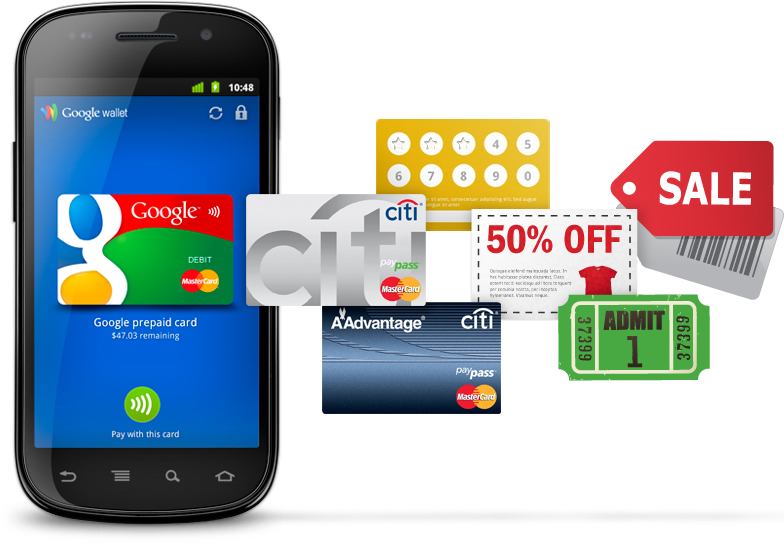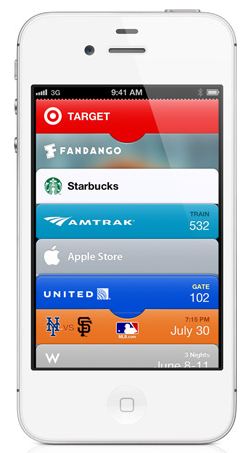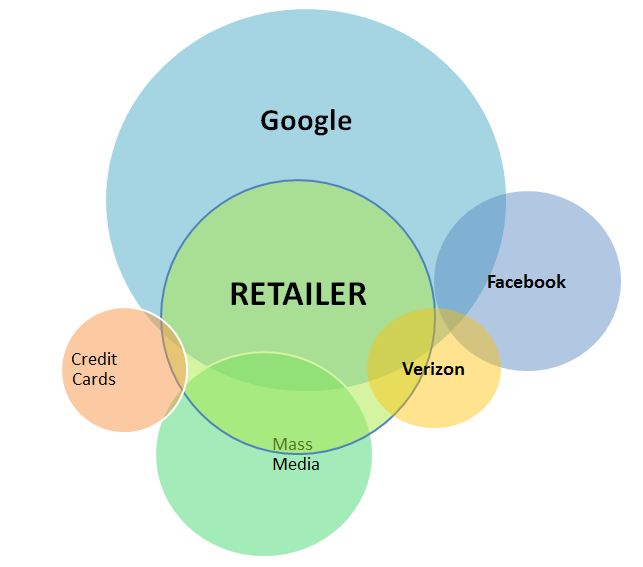Tag Archives: NFC
Controlling Wallets – Battle of the Cloud Part 3
Future of Phones.. Good Enough?
16 Sept 2012
Quote of the week
It’s not clear that NFC is the solution to any current problem…
Apple Senior VP Marketing – Phil Schiller
A few months ago I was in Hong Kong speaking with institutional investors at CLSA’s annual event. One of my more memorable meetings was with James, a chief investment officer with a top 5 investment bank. The heart of the discussion was on the future of telecom. Although I’m not a telecom expert, James was interested in finding “the next killer app” in mobile. Was NFC it?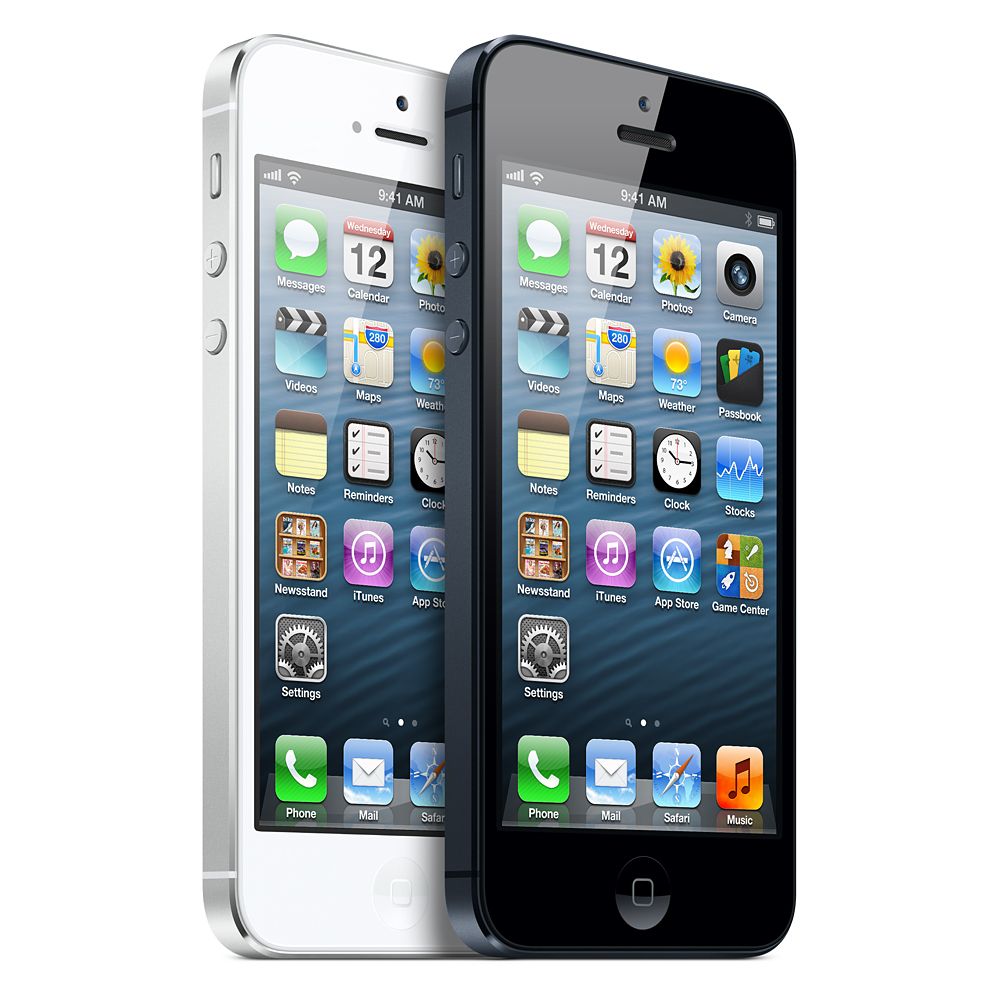
His investment thesis was that phones are starting to become commodities: screens, LTE connectivity, cameras, battery life, applications, …etc are all reaching a point of good enough. His time with me was spent drilling down into payments and NFC in order to see if I had any new data which would alter his view. I did not….
What will happen in a world where handset hardware is no longer the basis for competition? The same thing which occurs to any manufacturing area where a “good” becomes a “commodity”: margins compress for the commodity and migrate to the new area which is basis for differentiation/competition. Yesterday I outlined the implications, and investment opportunities, for the mobile operators.
This week we saw the launch of the iPhone 5.. better, brighter, bigger, lighter, clearer, faster, lasts longer, crisper, sturdier, takes better pictures, more tightly integrated to applications that Apple controls, …etc. A great new product. An Evolution… not a revolution. What Apple understands better than almost any consumer product company is: consumer experience matters. While some handsets already exceed those of Apple’s iPhone in feature/function (Samsung’s Galaxy S III)… none can match it on consumer experience. Experience is where Apple is focusing its efforts, and the major shift in iPhone capabilities is NOT in hardware features.. but on orchestrating value in ways it can control.
Apple takes a Clayton Christensen approach to the iPhone: what problems does a customer have, and how do I solve them? For example, I hate typing in my name and address on a little mobile browser to order a good from lets say Gap.com. Apple’s passbook will resolve this by allowing Gap to integrate to passbook to pull all of the “iTune’s account” information over .. so I don’t have to fill this out anymore. Apple is moving to solve real consumer problems… It is looking to orchestrate value delivery.. moving the “hub” of coordination from the phone to iCloud.
This is what I refer to as the Stage 4 Value Shift (see April Blog). Theoretically, an open innovation model (ex Google/Android, Java/Oracle, …) should be able to quickly surpass Apple, as 100s of small companies invest larger amounts (cumulatively) in expanding capabilities of a “platform” (see platform leadership). However, Apple has learned its lessons from its Mac days and has defined competition along the lines of “consumer experience”. In this model, it does NOT CARE about interoperability or standards… rather Apple is maniacally focused on delivering value to consumers with usability, reliability, intuitiveness, … being core measures. Apple’s brilliance is multi-faceted, but by defining product focus along the lines of consumer experience, the iPhone’s closed model of innovation can not only effectively compete, but win easily against open systems. In other words, while open systems compete more effectively in a feature/function war.. they loose in the qualitative measures of “experience”.
Apple will obviously monitor the environment for effective new features, to ensure that the core product hardware remains competitive. For example, the real world transaction data for NFC based payments is a complete joke. There are no phones, there are few terminals, and there is no consumer or merchant value proposition. Sure there are exceptions like Japan, but only closed systems with a monopoly leader have proven the ability to push the solution out.
Apple does see a need to improve device-device communication, as well as shrink the hardware footprint. With these drivers, and given the prototypes in market, I fully expect Apple to redefine phone hardware architecture with a new integrated chipset that would encompass functionality of: controller, radios (wi-fi, BT, 14443, …etc), secure element that would also enable the SIM to be virtualized and placed within the SE. If this is indeed Apple’s direction, it will not be a new basis for hardware competition on feature/function, but rather: battery life, footprint and control (ex. virtualized SIM).
Other players also have unique strategies and assets. For example, Google’s strategy: orchestrate value based on consumer data. In assessing investments I look for one key answer: what problems are platforms trying to solve and in what marketplace?
All about Commerce… and Entertainment
My major issue with Apple’s strategy is the degree to which other entities can participate. I see mobile phone revenue streams in 2 major buckets: Commerce and Entertainment. Entertainment is not a focus for me.. Commerce is. Businesses operating within the retail sector are undergoing fundamental transformation. For 1000s of years, local merchants survived based upon distribution and availability. Today they are left trying to sell a commodity product at a higher price to consumers in a marketplace with near perfect transparency.
What is the roll of any intermediary in commerce? Not just in the selling, and purchasing, but in marketing, product selection, distribution, service, support, … What does the new face of retail look like? This is the focus of Amazon… they are the leader here from a “virtual commerce” (e and m) perspective.
As an investor, I believe we will see a massive new wave of companies redesigning retail. Five years ago I had a camera, an iPod, a PDA, GPS, phone, … today I have one device. What will the bundling (or unbundling) of retail look like? What are the problems to be solved? In the past 15 years mobile has grown up along side of commerce, operating primarily as a replacement to fixed line and then migrating to a replacement for online. We will start to see phones leap into commerce in new ways.. but my firm position is that this leap does not start with payment (the last phase of a commerce) but with marketing (the first phase). Why? Because marketing and retail are fundamentally broken, and Payments is NOT.
It is in this context that I laugh at NFC solutions. My favorite quote on this topic was from head of strategy of top 5 retailer
“Mobile Operators know how to run dumb pipes, not create business platforms for marketing… their current wallet initiatives are akin to a toll bridge, NFC is their toll booth where they stop me before reaching my customer.. to cross their NFC bridge I have to wait in line and when I arrive at the gate they don’t want $0.50 toll.. they want 3.5% of what I’m carrying in my truck, and a copy of the shipping manifest (customers’ names). This model doesn’t work for me. “
Commerce will find another path… one of least resistance … of better “experiences”. This is what Apple is enabling in Passbook, and why Amazon is succeeding in commerce. NFC is just a radio… one who’s standards are largely controlled by banks, mobile operators and card networks. Why would retailers want to participate here at all? We should not act to enrich the complexity of payment networks, or wireless ones, but rather form new networks.
Sorry for the typos.. and re-hash of past blogs.. hope it was useful.
Battle of the Cloud – Part 2
Previous Blog – Part 1 – May 11, 2012
Let’s update the Cloud Battle story and discuss events since my last post on the subject
Square, Visa, Google, PayPal, Apple, Banks, … have recognized the absurdity of storing your payment instruments in multiple locations. All of us understand the online implications, Amazon’s One Click makes everything so easy for us when you don’t have to enter your payment and ship to information. (V.me is centered around this online experience). Paypal does the same thing on eBay, Apple on iTunes, Rakutan , …etc. But what few understand is the implication for the physical payment world. This is what I was attempting to highlight with PayPal’s new plastic rolled out last week (see PayPal blog, and Target RedCard). If all of your payment information is stored in the cloud, then all that is needed at the POS is authentication of identity (see blog).
The implications for cloud based payment at the POS are significant because the entity which leads THE DIRECTORY will have a significant consumer advantage, and will therefore also lead the breakdown of existing networks and subsequent growth of new “specialized” entities. For example, I firmly believe new entities will develop that shift “payment” revenue from merchant borne interchange to incentives
Since May, the following “significant” events “in the battle” have occurred:
- Retailers have launched MCX with Wal-Mart’s Mike Cook as the lead. I want to emphasize, this is not “mobile payments” but rather a low cost payment network (Cook talks about $0.05/payment). Some retailers will seek to integrate their loyalty card, others will create plastic (see Target RedCard), others will certainly couple with mobile. WMT will likely integrate with a virtual wallet that manages digital coupons (Coupons.com likely leading)
- Apple has rolled out Passbook in June.. See my Blog, and hardware analysis from Anandtech of why there is no NFC.
- PayPal had a marketing announcement with Discover. Why would you announce something like this with no customers? Paypal is expanding its network… but merchants are just laughing.. MCX wants a $0.05 payment, Durbin gave them a $0.21 payment and Paypal wants to get 180-250bps. As you can tell, I don’t think much of this, as the Merchants are still in control of their payment terminal. This is also not an exclusive deal with Discover. I expect 2 other major players to partner with Discover in next few months. Paypal just wanted to run with this announcement before the other products come out. I also want to emphasize that DFS is a BUY. They will be a partner of choice as they run a subscale 3 party network that can adapt much more quickly than V/MA. As a side note, Paypal will likely expand distribution of their own plastic. See related blog.
- Google rolled out Wallet 1.5 on August 1 (see blog). This is one of the biggest moves in payments and provides an enormous retailer value proposition (aligned to MCX). Google didn’t follow PayPal, Passbook, or Microsoft.. they rolled out product that was 1.5 yrs in progress. Google’s new cloud wallet allows the consumer to select any payment method, and provides the merchant with a debit rate (Bancorp non-Durbin 1.05% + $0.15 (note Google/Issuer can lower this for merchants, as any issuer could, this is a MAX rate). Google is CURRENTLY loosing money on the payment side of the business in hopes of making it up on the advertising side. This is no marketing announcement like Apple, Microsoft and Paypal.. this is a product announcement.. it is working today in my new Galaxy phone. This is also the first PRODUCTION cloud wallet for the POS. Apple, Amazon and Paypal dominate cloud wallets in eCommmerce and mCommerce. Google and Amex’s Revolution money are the only one’s doing it at the POS.
- Square acquired all 30M Starbucks mobile payment customers (see Blog). Square has done a great job acquiring merchants.. but was hurting on the consumer side. Square wants to build network and needed a pop on the consumer side. Square’s business is pivoting toward marketing and consumer experience. Within the next year, the little Square doggle will be a thing of the past. Starbucks is committing to the Square register experience, and Square is relabeling “card case” to “Pay with Square”.
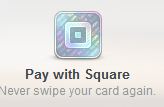
- LevelUp is making payments “free” for merchants as part of a loyalty value proposition. This is an example deal.. expect more to follow. Issue is that different merchants have different priorities. LevelUp is focused in QSR/Casual Dining and is operating as part of a loyalty play. I’ve outline their revenue in this blog, don’t think it is sustainable unless they can move into acquisition.
- ISIS has lost key executives in its product area, AT&T is rumored to have a NFC/Wallet RFP of its own out and even Verizon is planning to let Google go ahead and put its wallet on the Samsung Galaxy III phones.. after all what choice does it have?
- Card linked offers and incentives in the cloud. No one is making money in this space, large retailers are not participating, hyper local merchants (who are interested) are very hard to sell to, and consumers don’t see relevant content (thus redemption rates under 2%).
Where are the cloud battle lines? Well most significantly the battle lines are forming away from NFC (as I stated in January). Even my old friends at Gartner have caught up and placed NFC in the trough of disillusionment. To restate, NFC is not bad technology.. but it delivers no “value” in itself beyond control. Mobile operators have consistently failed to build a business around a “control” strategy (see my Walled Garden Blog). In the ISIS example they mandated use of credit cards only, as this higher credit interchange was the only way to make revenue. Well guess who pays the freight here? Yep the merchants… Wal-Mart and its peers were not thrilled at giving issuers and MNOs 3.5% of sales for the privilege of accepting a mobile payment.
The Cloud battle is complex, as the strategies are about MUCH MORE THAN PAYMENT. Payment is the ubiquitous service that is the last phase of a successful marketing, engagement, shopping, selection, deliver, retention, loyalty process. Leaders from my vantage point:
Payment Networks:
- Mastercard focused on acting in supporting role globally.
- Discover similar to MA, but with much greater flexibility as it operates in a 3 party network and is both issuer and acquirer.
- MCX – Not a leader yet, but has CEO mindshare of every top US retailer. They seem overly focused on the cost side. There is a very big whole in their customer acquisition strategy. MCX is bidding out its infrastructure now, my guess is that Discover or Target will win it.. and the the RFPs are just a way of keeping Banks “in the tent” to keep them from changing ACH rules to kill it like they did to Scott Grimes at Cap One (decoupled Debit).
- Google – has more consumer “accounts” than any company on the planet. Can it convert them to accounts with a linked payment instrument? Google also “touches” more customers, more times per day than any other company, its heavy influence in the shopping process positions it well with retailers. Also has the best retailer sales force of anyone on this list, as they bring in customers to retailers every day. Android/Google Wallet….
- Square – Best customer experience hands down (register). It also has the most traction among small retailers
eCommerce/mCommerce:
- Apple – expect Passbook to dominate mCommerce. It will be the killer app.
- PayPal – Challenged in market adoption beyond eBay/GSI customer base. Top ecommerce sites like Amazon and Rakuten have their own integrated payment, also 50% of eCommerce/mCommerce goes through Cybersource which Visa acquired. Paypal’s future growth driven by international
- Amazon – leading eCommerce/mCommerce player. When will it take one-click beyond Amazon? Amazon’s experience is best from end-end…. PayPal/Apple will operate around the periphery of non-Amazon purchases.
- Rakuten – “Amazon of Japan” who now also owns buy.com. Fantastic experience and leading eCommerce loyalty program.
How many places do you want to store your payment credentials? Who do you trust to keep them? What data do you want providers to know about you?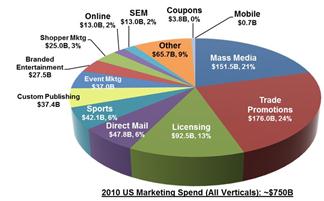
From a macro economic perspective, total payment revenue for all major participants is just under $200B in the US. Total marketing spend in the US is over $750B. Total retail sales in the US is $2.37T (not including oil/gas, Fin services, T&E). Marketing is fundamentally broken… payments is not. Retail sales gross margin has been compressed from 4.2% in 2006 to 2.4% in 2010. Who is best able to execute on the combined retail and marketing pain points? Who can be retailer friendly? Consumer friendly? Marketing friendly?
I start my analysis with #1 the consumer value proposition, and #2 the merchant value proposition. Entities like Google, Paypal, Apple already have tremendous consumer relationships and traction. They thus have very few “acquisition” costs. However, these entities do bear the costs of changing customer behavior. There are many approaches for changing customer behavior:
- Incent behavior – direct/indirect/merchant
- Customer Experience (ex Square)
- Service integration (reduce effort or # of parties)
- Reduce risk – financial (security/anonymity…)
- Reduce risk – purchasing (social, community reviews, …)
- Value proposition in commerce process (indirect incentives)
- Marketing
- ..etc
Other groups like MCX and ISIS bear the cost of both customer “acquisition” AND behavior change for: Consumer, Merchant or Both. As I state previously. one of my favorite arcane books I’ve ever read was “Weak Links” I’m almost reluctant to recommend it because it is so good you may jump ahead of me on some of my investment hypothesis. One my favorite quotes from the book
Scale-free distribution (completely open networks) is not always the optimal solution to the requirement of cost efficiency. .. in small world networks, building and maintaining links between network elements requires energy…. [in a world with limited resources] a transition will occur toward a star network [pg 75] where one of a very few mega hubs will dominate the whole system. The star network resembles dictatorships in social networks.
Networks like V, MA, PayPal, Amex and DFS are working to participate in this new Macro economic opportunity. But established networks are hard to change
“The network forms around a function and other entities are attracted to this network (affinity) because of the function of both the central orchestrator and the other participants. Of course we all know this as the definition of Network Effects. Obviously every network must deliver value to at least 2 participants. Networks resist change because of this value exchange within the current network structure, in proportion to their size and activity.”
The implications for cloud based payment at the POS are significant because the entity which leads THE DIRECTORY will have a significant consumer advantage, and will therefore also lead the breakdown of existing networks and subsequent growth of new “specialized” entities. For example, I firmly believe new entities will develop that shift “payment” revenue from merchant borne interchange to incentives (new digital coupons).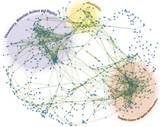
The current chaos will abate when an entity delivers a substantial value proposition that attracts a critical mass of participants. Today most mobile solutions are just replacing a card form factor… this is NOT VALUE. I am currently placing my bets on solutions that merchants support (Square, Google, MCX, LevelUp, …) as this is a key “fault” of almost every other initiative.
Comments Appreciated (as always sorry for the typos…)
Apple and NFC
Apple and NFC..
Nothing really new here for the NFC crowd. No new information.. Purpose is to paint a picture by which investors can make a call.
Most of the issues associated with NFC today are NOT technical.. but rather business: What value can it bring? Who controls it? Who makes the money? How is it shared? For payments… NFC has been a complete bust (with the exception of Asia). Retailers just aren’t excited about the prospect of paying credit card interchange (3.5%) for the privilege of accepting a mobile payment which funds a 12 party supply chain (necessary to make NFC work).
The WSJ (July 6, 2012) and I both have consistent information that Apple will NOT be rolling out NFC in the iPhone 5. If true, I believe Apple’s exec team is taking a brilliant approach to be a late follower here. Let everyone else pay the freight to educate the customer, and establish a high level retailer POS value proposition (with associated retail infrastructure). Apple is much better positioned to extend the App Store experience into mCommerce.. and control the customer end-end experience. Apple will also likely expand “selectively” into physical commerce areas like ticketing.
To be clear, I’m not positioning that Apple has run away from NFC.. but there has been no success to date and there is no reason for Apple to run into this space. In order to monetize and sort of physical POS solution, Apple must have a business structure that can orchestrate a very complex “physical commerce” value proposition. Keep in mind Apple doesn’t have much of a sales force to cover advertisers AND retailers globally. Rather than “focus” on the POS, or implementing standard NFC chipsets, I see Apple doing something “unique”… What is it?
I was meeting with senior NFC execs this week, and the consensus view is that Apple will likely redefine phone hardware architecture. Most of you have read about Apple’s recent patent application which would allow the SIM to be logically placed within the SE. Also there are rumors about expanding the capabilities of the Radio and Controller to also cover Bluetooth functionality. The “value” that an integrated hardware solution? Not that much different than what NFC alone is capable of.. but it would greatly reduce footprint, power, time, and perhaps even expand “throughput” (example Accelerating/bypassing BT pairing: NFC is 424kb/s while Bluetooth V2.1 is 2.1 Mbit/s).
Although far from being an expert in this area, my summary view is that Apple recognizes the need for a secure radio and data store in the device that it can control. A metaphore for an ID. How do they want to control this ID? Well they certainly need to secure the wallet access (AuthenTec $356M last week, plus rumored IRIS scanning).
This approach is opposed to that of the carriers all of which are working very hard to “standardize” on an NFC architecture (Single Wire Protocol – SWP) that they will control. Apple’s plans are firmly in the opposite direction, and a brilliant business move. Giving carriers the control over this utility would be akin to letting them run an app store that they control.
Apple may be running much faster than anyone in the industry knows toward this vision. Perhaps they have already indigenously created this new combined secure element/UICC/BT Radio. Although I see no need for them to run with this early… But if they did create this capability in the iPhone 5 they will certainly have the control to govern how it is used.
What does this means for investors? Perhaps you start by asking Vivotech’s .. as they just folded up shop after 12 years. A fantastic team with a rock solid product line.. their fault? Betting NFC would take off sooner. Given Apple’s unique ability to capture mobile ecosystem profits it is always tough to find areas to nibble. On the software side, how can new companies help Apple orchestrate value propositions in the physical world? Retail? Ticketing? Healthcare?.. The times.. they are a changin…
Apple Passbook: No NFC Here…
I’ve covered this topic quite a few times
- 12 June tweet “Apple’s strategy brilliance: stay away from delivering experiences you can’t control.”
- “Battle of the Cloud Wallets” in May
- Apple and NFC Part 2 (Feb 2012)
- Apple and NFC Jan 2011
As most of us have known Apple has been out of the NFC game for some time (18mo+). It’s just amazing that the mainstream press can be so caught up in a disinformation hype cycle that seemed to have been started by some kind of patent application. Yesterday’s WSJ had a fantastic article on Apple’s plans.
What makes for a “successful” consumer wallet? From previous post:
Customer Trust, Customer Control, Convenience, Ubiquity (opposite of lock in), Intuitiveness, Experience in Use (buying, redeeming, accessing, ..), Security,
If I have a wallet that only accepts 3 cards that are not accepted at any of the top 20 retailers (ie ISIS), it is of little value. Why not let consumers control what goes in? This is where carriers must get to in order for NFC to survive. Even then, NFC phones are far from my recommendation. After all if your payment information is locked in a mobile phone how do you use it when you are at your computer buying something on Amazon? Locking information in a phone is just plain stupid in the age of the cloud.. most agree that individuals should have a their information in a cloud they control. The NFC zealots reading this blog will respond that it NFC doesn’t require a network and is more reliable… my response, the POS and payment terminals are connected.. NFC doesn’t need to hold the card in the SE.. it just needs some sort of identifier.. or in the Square cardcase example no NFC at all just your voice print. After all if there is no auth from the payment network.. the transaction will not happen.. so something is connected in 99%+ of card transactions.
I’m very impressed that Apple’s exec team has kept the iPhone away from NFC… strategy brilliance is an understatement. By expanding Apple’s ownership of Digital Goods (old blog here with financials) into mCommerce (ie physical goods bought via phone) and narrowly aligned Physical commerce (ex. Ticketing) they can maintain ownership of the entire consumer process.. from marketing, sales, purchase and “delivery”.
Apple’s unique ability to garner 75% of mobile handset profits is shifting from DESIGN to VALUE ORCHECTRATION (see blog). No one can orchestrate value in NFC (see 12 party mess). What is truly ironic is that as the carriers spend hundreds of millions of dollars on NFC and their walled garden strategy to “force control”, Apple and Google will be further ahead in coordinating value in new networks. This value delivery outside of the mobile network will further cement carriers roles as dumb pipes (related blog). This seems to support my hypothesis (often stated) that it is nearly impossible for legacy networks to adapt in delivering new value propositions.
NFC and Consumer Choice
7 May 2012
Thinking about consumer choice today. As the MNOs think about how to lock up the SE and SE Management.. when does a consumer get to choose what is on their phone?
As most of you are aware, ISIS is charging each and every issuer for the “right” to put their cards on the phone. In a tweet 2 weeks ago I mentioned that all of the phones in market have a major problem: they can only support one card emulation application at a time. Although I’m not completely sure if this is a firmware issue or “silicone/memory” issue it relates to the storage on the NXP’s chip. Apparently the latest version’s of NXP’s chips don’t conform to Amendment C of Global Platform’s 2.2 Specification (supporting multiple card emulation apps).
http://www.globalplatform.org/mediapressview.asp?id=777
What this means is that your new NFC phone could have hundreds of Visa cards loaded.. or hundreds of MasterCards.. but the phone can’t support the signed java applets (card emulation apps) from Visa (paywave), Mastercard (paypass), Discover (zip), Amex (expressPay), Transit (…).. you get the picture.
Doesn’t everyone want a wallet where all of your cards can get stored? Visa, MA, Amex, .. plus loyalty, gift, … ?
My hope is that the market (and regulators) will push to keep consumer choice at the center of mobile phone wallets. If the carriers can’t lock down the SE, consumers will be able to choose the most effective option. Retailers know that the only cards willing to “PAY” to get in the ISIS wallet are credit cards.. which obviously impact their interest in accepting a 350bp payment product.
The mobile wallet that “wins” will be the one that offers consumers the most control. Letting consumers load any card they want.. without that card issuer first having to pay some sort of toll to the mobile operator. Also letting the consumer decide who gets access to what data. This last area is something that needs improvement beyond data that is stored in the SE. Right now apps are taking the approach of “take it or leave it” agreeements:.. we get your location, e-mail, contacts, usage, … This terrible approach is leading to an unbelievable dissemination of data that is completely out of control. This is why HTML 5 will win.. Apps are becoming the paradigm by which companies obtain almost unlimited customer information.. and consumers will wake up soon.
As a side note, isn’t it amazing that this topic hasn’t been covered more broadly? Of course it speaks to the true uptake of mobile payments (at POS) in general..
My funny story: I went to the Duane Reade directly across from Penn Station last month. DR was a Google wallet launch retailer in NYC, with all of the beautiful marketing logos. I waved my phone to check out.. and the store manager was there behind the 8 cashiers.. he said “is that Google Wallet”.. I said no it was a Citi Sticker glued to the back of my iPhone.. I asked him how many purchases he has seen from people using their phones.. Answer “none in the last 2 months”… Across from Penn Station… wow..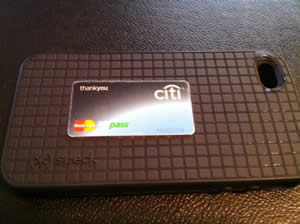
Worlds Largest mPayments Partnership?
This stuff gets harder to interpret every day. My guess is that Vodafone is integrating the “Visa Wallet + Prepaid” products into what Vodafone has built. This enables banks to accelerate adoption, and to “partner” w/ Vodafone for the defacto stored value account within a given market. This obviously simplifies the regulatory issues. Not a bad plan.. but how can you decipher this from the PR? By integrating the Visa Wallet (ex CYBS) they can also extend beyond POS … So key question to ask here.. WHERE is the stored value card held? In the phone alone?
Comments appreciated
Apple and NFC?
1 Feb 2012
Apple and NFC? I don’t think so.. my bet is 70% against. Great that Apple can keep us all guessing. Why put a 5th radio in the iPhone? AND hand carriers control of SE. There is just no upside for Apple here. NFC would not enhance their wonderful mobile customer experience… it may even kill their Apple/App Store/Apple ID/Payment Instrument advantage.
It would be smarter if they would buy Square… payments belong in the cloud… not locked in the phone. All you really need at a POS is an Irrefutable ID. In a Square scenario, Apple could leap frog everyone in customer adoption and enable every iPhone owner to pay with their voice and GPS location ( Apple has payment instruments tied to every iTunes account). The gap in this scenario is merchant adoption, existing merchant processor agreements/hardware, and retailer reconciliation (if multiple processors). Apple, if I were you I would sit down w/ Square, FirstData, TSYS, … and see what could be done. NFC requires coordination of too many parties.. a late follower would be a much better place to be. Your top risk is that consumers will buy phones based on mobile wallet. Your short term strategy? I pay with my iPhone today (see pic). 
Don’t get me wrong, NFC can work.. but the carriers have proven inept at managing a platform business which would incent the participation of many businesses, allowing all to make money. Instead they operate as a toll bridge, but expect to take a portion of the goods in transit. If you operate as a toll bridge you are a dumb pipe… period. It just does not take much intelligence to run a control business, sure it is complex to build the bridge.. But it even more complex to coordinate the logistics of the world’s commerce. The carriers focus on control is killing the prospects for NFC’s success, as they attempt to act like an orchestrator (requesting a % of goods in transit) but have the ability of a toll collector.
Commerce will find another path… one of least resistance. This is what Apple should do as well. NFC is just a radio… one whos standards are largely controlled by banks, mobile operators and card networks. Why would retailers want to participate here at all? We should not act to enrich the complexity of payment networks, or wireless ones, but rather form new networks that are retailer and consumer friendly. Bluetooth, wifi, gps, voice, facial recognition, sms, .. all can do the job NFC does. We will not see harmony here over the next 20 years, particularly as the only payment instrument in a mobile wallet is a 300bps+ credit card.
Why is Japan successful? because they have a dominant carrier that built a business model.. same in Singapore and Korea… in the rest of world.. chaos will reign until someone delivers retailer and consumer value.
Related Blogs
Update 3 April 2013
My bet on next version of iPhone? Broadcom’s BCM43341 chip
Broadcom has launched the industry’s first quad-combo chip. The BCM43341 combines NFC, Wi-Fi, Bluetooth and FM radio on one chip and, says Broadcom, “offers OEMs unmatched size, power and cost advantages.”
A second new product is a single card solution that pairs a BCM20793 NFC controller as used in the Google Nexus 4 with an 802.11ac (5G) WiFi radio and is aimed at high end mobile phones and devices.
Does that mean the next iPhone will have NFC? yep.. but not in the way we think about it today.
http://tomnoyes.wordpress.com/2011/02/03/isis-platform-ecosystem-or-desert/
http://tomnoyes.wordpress.com/2011/12/05/isis-delay/
http://tomnoyes.wordpress.com/2011/10/26/apples-commerce-future-square/
Building Networks and “Openness”
8 Dec 2011
I’ve been reading some off beat stuff lately. One book “Weak Links: Stabilizers of Complex Systems from Proteins to Social Networks” was very thought provoking. As Mark Stefik (PARC Fellow) said ‘Something magical happens when you bring together a group of people from different disciplines with a common purpose.’ The combination of people, experience and approaches often leads to unexpected consequences.
As an engineer I like to solve problems.. I usually learn more from mistakes than I do from successes… but it is the learning that is fun. As an investor and entrepreneur I don’t like making mistakes… my preference in the start up environment is to have the learning cycle counted in minutes and days (vs customers and capital). I was speaking with a US Central Banker last month and the concept of “openness” was discussed. A hypothesis was laid out by the Fed “Mobile payments are not taking off because of a lack of common standards”. The Fed team is very good, the best way to encourage a good dialog is to lay out something radical; as for this hypothesis I disagreed completely. As stated in my numerous blogs: history has clearly showed that closed systems must form before open ones. I also told the Fed that the problem in US mobile payment IS NOT lack of standards but lack of a value proposition to consumers and retailers. In other words existing payment instruments solve all of my problems.. mobile payment simply does not add additional value (in isolation) compared with existing products (See Mobile Advertising Battle). In order to stimulate a change in behavior (merchant and consumer) there must be a strong value proposition. Two years ago I discussed the implications for broad payment standards in SEPA: Chicken or the Egg and in March of this year I outlined how SEPA has depressed payment innovation in the EU.
Given all of the chaos in NFC at the moment, I woke up this morning asking myself what is the “right amount” of openness and standards? How do successful networks form and mature? What are successful “open” networks? What is the first “open” standard you think of ? TCP/IP? Linux? Java? RosettaNet? EDI? Open Network? Internet? GSM? US Interstate system? SEPA? The Weak Links book opened my eyes to many new concepts, one was on how affinity influences network creation, and another on how few open networks exist in Nature. Networks form around a function and open networks are not necessarily the most efficient.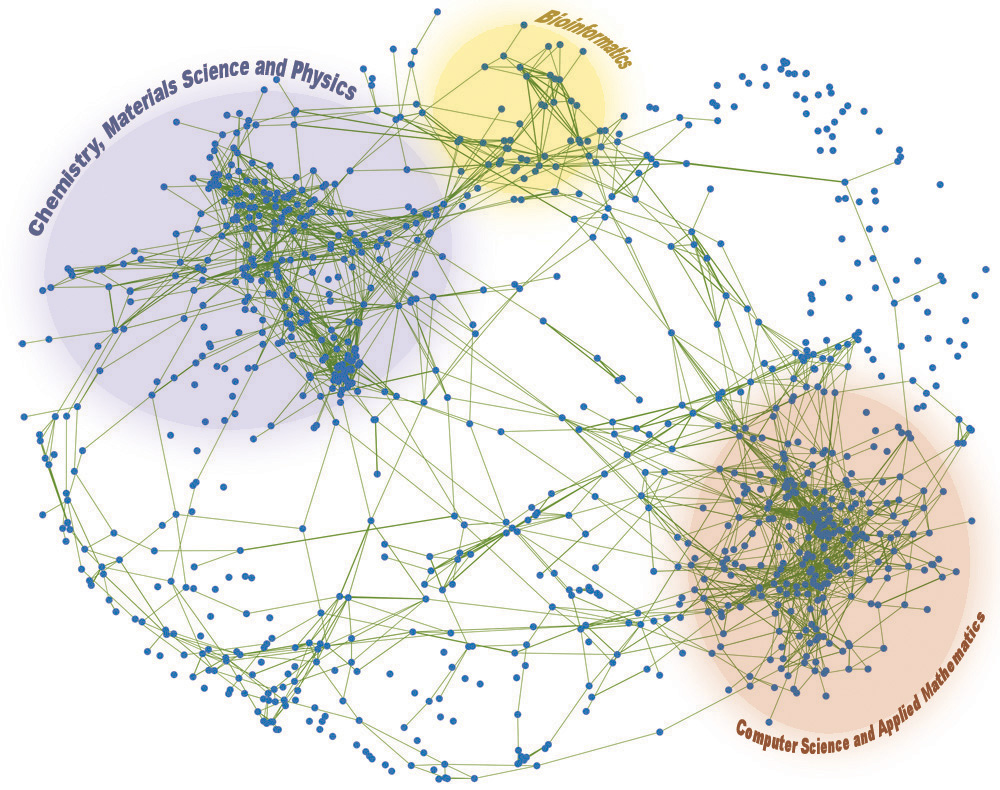
Scale-free distribution (completely open networks) is not always the optimal solution to the requirement of cost efficiency. .. in small world networks, building and maintaining links between network elements requires energy…. [in a world with limited resources] a transition will occur toward a star network [pg 75] where one of a very few mega hubs will dominate the whole system. The star network resembles dictatorships in social networks.
The network forms around a function and other entities are attracted to this network (affinity) because of the function of both the central orchestrator and the other participants. Of course we all know this as the definition of Network Effects. Obviously every network must deliver value to at least 2 participants. Networks resist change because of this value exchange within the current network structure, in proportion to their size and activity. Within the EU, SEPA undertook a rewrite of network rules and hoped that existing networks would go away or that a new (stronger) SEPA network would form around its core focus areas (SCT, SDD, SCF, ..). It was a “hope” because the ECB has no enforcement arm. In other words there was a political challenge associated with ECB’s (and EPC specifically) ability to force an EU level change on domestically regulated banking industry.. given that SEPA rules destroyed much value in existing bank networks, the political task was no small effort. We have seen similar attempts (and results) when governments attempt to institute major change in networks (Internet NetNeutrality v. Priority Routing, US Debit Card Interchange, …)
Mobile Payments Standard?
If we take a look at today’s payment networks what are the biggest problems to be solved? I have a perspective, but its certainly biased. How about payment routing and speed? These seem to be common merchant and consumer concerns. Keeping with an internet analogy, can you imagine if there were no DNS servers to route IP traffic? Every router would have to keep the directory for the entire internet not only of the final destination, but also the most effective route to forward traffic. What if the internet were not indexed? No ability to find information (thanks Google for fixing this). In the payments environment, the central assets of Visa and MA is 1) A Directory and 2) the rule that EVERY participant must route traffic through them (with a new PIN debit exception in US).
Outside of card transaction’s banks maintain their own directory for routing retail and commercial payments; this is called “least cost routing”. A key bank service I 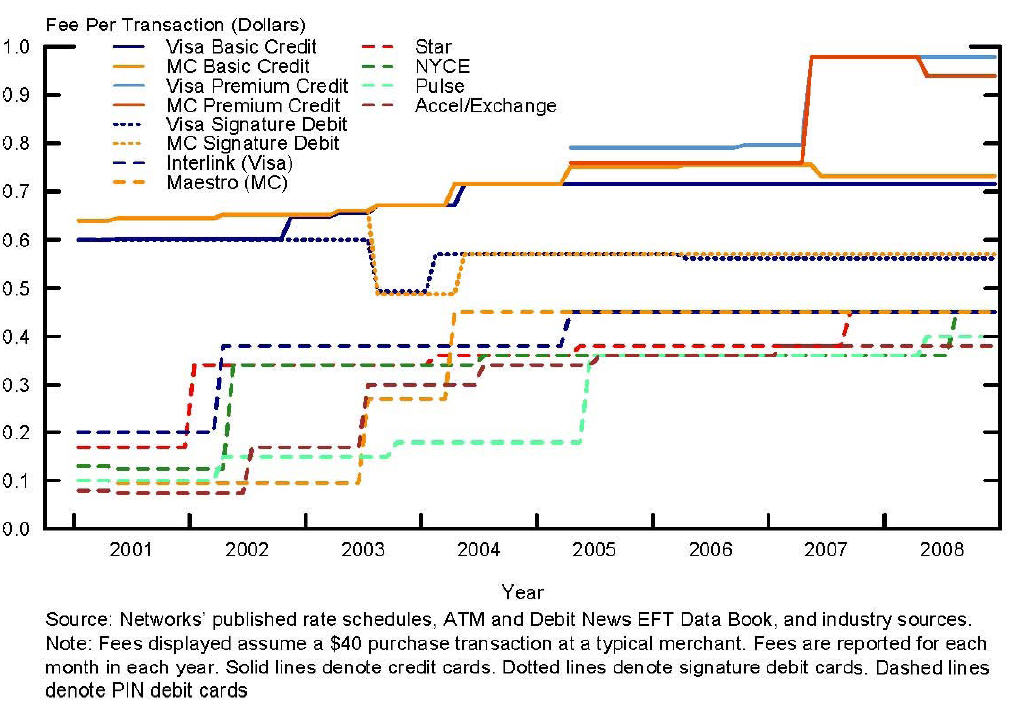 would propose (note: I’m not the originator of this idea) is a universal directory service mapping e-mail, phone and account numbers. In Australia, the banks have this today run by my friends at Cardlink and completed under project Mambo. In the US, The Clearing House (TCH) has had the UPick service completed for a number of years.. without much interest.
would propose (note: I’m not the originator of this idea) is a universal directory service mapping e-mail, phone and account numbers. In Australia, the banks have this today run by my friends at Cardlink and completed under project Mambo. In the US, The Clearing House (TCH) has had the UPick service completed for a number of years.. without much interest.
My thought here, is that rather than facilitate a EU mistake in mandating a change in all rules.. decrease the switching costs between networks so that market forces can take hold. I’m not proposing to take the directory public.. but at least give regulated entities equal access. In Australia the driver was to decrease bank switching costs, also note that Australia has no Signature debit.. just as in Canada. A common directory could also follow rule that non-regulated institutions could not hold account data (or card number).. Just as I don’t have to know my Bank’s IP address.. I could use another identifier (email, mobile, …) for online transactions. The danger for banks is that this would certainly open up the world of least cost routing to non-banks. Payments would become “dumb pipes”.. which is perhaps what it should be.
Mobile payments is certainly not critical government infrastructure. So what is Government’s proper role? Consumer data protection, transparency, regulatory requirements, equal participation/access.. ? I don’t know the answer. I like the idea of the Government creating a model service for R&D purposes.. perhaps based on Fedwire and letting non-banks have access to it… I also like the idea of a common directory.
ISIS
For 2.5 years I’ve been writing about ISIS.. I’ve always have been a huge advocate.. until lately. What has changed? My position, and that of retailers, is that today’s payment networks are heavily tilted in favor of the banks. The opportunity I originally saw for ISIS was constructing a new merchant friendly network that was an “extension” of the current mobile network which the carriers run (The original business case for ISIS is outlined in ISIS: Moving Payments from Rail to Air).
Keeping with my theme of openness and standards how is ISIS creating a platform for other to invest in? What value is an ISIS mobile payment to a retailer? Yesterday’s blog talked about the complex supply chain necessary to deliver on NFC. Don’t get me wrong, there is nothing wrong about NFC technology.. it is a very well defined specification. But it is complex.. if it was a NEW WAY of doing payments (or better yet commerce) perhaps it should have started a little less ambitiously. The team seems as if it prudently sought to reduce risk, but it also gave up on a central element to its value proposition. My analogy for today is that ISIS project is like Vanderbilt’s skipping steam and going straight for high speed mag lev in 1880…. While the entire country was growing at a 10x pace and he had no right of way..
Big projects are tough in normal times.. but mobile is changing at an unbelievably fast pace. Small focused projects are certainly lower risk when innovating at the cutting edge. Everything is changing.. how could anyone architect an open system in such a fast changing environment? It would seem that technical standards like TCP/IP or GSM were successful because of their ubiquity and distributed control. They could be used by all to create different networks with different value propositions.. which incented millions of companies and consumers to invest. I just don’t see how MNOs can create a business platform based on NFC. Their best shot may be to work with someone like Sequent Software to create an architecture for 1000s of applications to access secure element data.. instead of the one single CSAM wallet coming out in Pilot Dec 2012.
Your thoughts are appreciated
Previous Blogs (Nokia NFC Ecosystem, ISIS Ecosystem or Desert, Banks will win in Payments.. but WHICH ones?)

